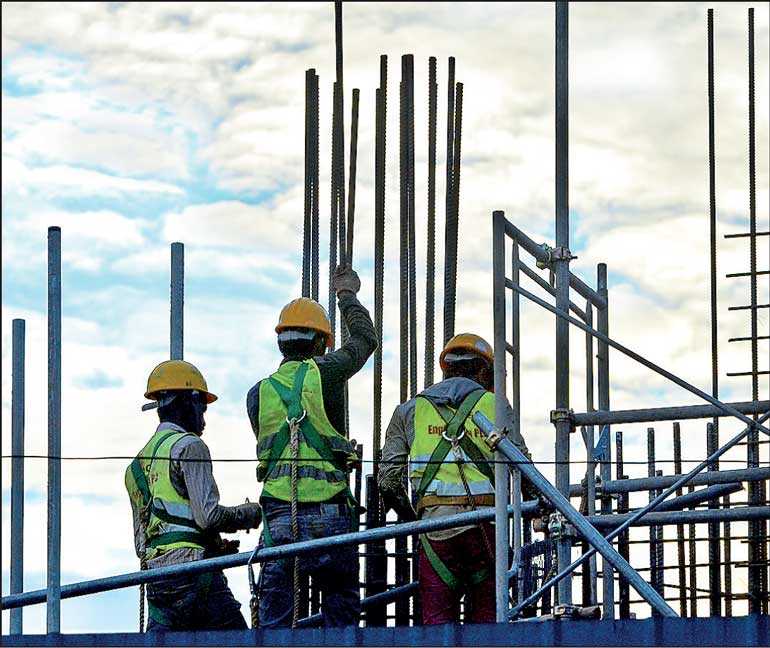Tuesday Feb 17, 2026
Tuesday Feb 17, 2026
Friday, 26 June 2020 00:00 - - {{hitsCtrl.values.hits}}

Recently, Prime Minister Scott Morrison was speaking at the National Press Club on post-COVID economic revival of Australia. He had many questions on his Job Keeper policy (government support for businesses to keep people employed) during the pandemic and his thinking on post-pandemic Job Maker policy (how government wants to support business to create jobs).
He had many intelligent and relevant questions from the audience which consisted of mostly senior journalists. Majority of the questions were based on business continuity, reducing unemployment and on employees’ rights. At one point, based on the number of questions that were asked, PM Morrison asked the audience “what comes first, business or jobs?”. This made me think more deeply, the answer that I should provide had anyone asked me the same question.
Whether COVID or No COVID, understanding the answer to the question “what comes first, business or jobs?” is important especially to both entrepreneurs and employees. It is equally important for all other key stakeholders, including the governments, to understand the relationship between business and jobs, and the economic value of it. Central Bank of Sri Lanka statistics indicate that the private sector  employs 43% i.e. approx. 3.5mn of the 8.1mn employed population. It is a critical segment of the Sri Lankan economy. Therefore, knowing answers to the question “what comes first, business or jobs?” will be important to the owners of private sector enterprises and their employees.
employs 43% i.e. approx. 3.5mn of the 8.1mn employed population. It is a critical segment of the Sri Lankan economy. Therefore, knowing answers to the question “what comes first, business or jobs?” will be important to the owners of private sector enterprises and their employees.
In addition to direct job creation, there are many other indirect jobs that are created by businesses. Many forget indirect job creation from investments. Therefore, when discussing jobs created by investments, both the direct and indirect jobs have to be considered. Further, the socio-economic benefits arising from investments and jobs are also generally forgotten. This article will not address the socio-economic benefits and challenges of investments, as it is a separate topic in itself, but it is an important aspect that should not be forgotten. Governments are aware of the crucial role played by the private sector within the economic cycle, and that’s why governments encourage the private sector to invest and provide incentives for investments. It’s a no brainer that the reverse (i.e. divestment) or no investment is detrimental to any economy, hence protecting businesses is important not only for governments and employees, but also for the society at large.
Business (investment) comes first but can a business exist without jobs (employees)
Businessmen are generally good entrepreneurs. They take risks and expect a good return on capital employed. If entrepreneurs don’t invest, we will not have businesses. Hence, it’s true and no argument business comes first. However, businesses must convert the capital investment to products or services and market profitability to generate the expected return. Depending on the level of automation and technology, most businesses will create jobs and recruit people to carry out these jobs.
People recruited for these jobs will have to perform well and help deliver the expected return on investment. If people in the jobs don’t perform (due to various reasons) business will not be able to deliver the expected returns and in some instances, may even have to close down. If businesses are to succeed, they should have the right people in the right jobs, train and motivate them and reward them for their contributions. Although jobs come after investment, without the efforts of those performing jobs the expected results will not be realised.
Whilst investment comes first, without employees performing the allocated jobs effectively and efficiently, investments will not be successful. Therefore, it’s a partnership, where both parties understand the role of each other and work together, one party should not be superior to the other. In the current COVID environment, this partnership is even more important than ever before.
Why is business and jobs (employer and employee) partnership in the current COVID environment important?
Answer is simple, in the current COVID environment both parties depend on each other even more when compared to the past. Both parties have challenges. Enterprises, whether large, medium or small face business continuity challenges, especially due to reductions in sales on account of market conditions, import restrictions and liquidity shortages, whilst employees are looking for security in terms wages and jobs.
Both parties have a role to play in safe guarding the business, and must help each other to achieve their objectives. Therefore, it is in the best interest of all to avoid common mistakes generally made by both parties and work towards a mutually agreed goal that is relevant today, i.e. short term survival of the business to ensure its longevity.
Effective relationship between the employer and employee will develop a great partnership that will not only help grow the business, but also protect it in difficult times. Bad or strained relationships will disconnect the two parties, impacting the delivery of business goals. Therefore, good relationships develop great partnerships and great results.
Avoid common mistakes made by employers and employees (business, jobs) that impact the relationships
Although, in the pre-COVID period these common mistakes may not have made a significant impact to the business as they would have been absorbed as inefficiencies, such mistakes today will be costly than in the past, as the margin of error will be thin or zero due to challenging market conditions and low liquidity.
If there are any issues in an employer employee relationship, both parties must first understand the underlying reasons that cause these issues, discuss them cordially and identify means to resolve them. It is critical especially in the current COVID environment for employers and employees to help each other and address the core issues facing the business. If common mistakes noted below are not avoided, it will be tough for both parties to achieve a mutually agreed goal for the betterment of the business. Decisions and actions by either party in such a scenario could be sub optimal and impact the longevity of the business. Such situations should be averted. Some common mistakes to avoid are;
Not communicating with each other
Not trusting each other
Knee jerk reactions to situations by one or both parties without looking at the big picture
Not focussing on long term sustainability of the business
Corporate and employee greed and selfishness
Not treating employees humanely
Inability to make sacrifices
What can be done to improve the employer, employee relationships?
Common goal in the current COVID environment should be the longevity of the business so that investors, the job holders and all other stakeholders can continue to enjoy the benefits from it. There is no one size fits all solution, but businesses could consider ideas similar to those noted below or take actions that suit the situation but key focus should be on how employers and employees build a relationship that can work towards a common goal.
Communicate the business reality and ensure transparency
Business should share the challenges it is facing in the current COVID operating environment, impact of it on the business and the consequences. There should be transparency in sharing the facts and business should build employee trust by being open and honest about the situation it is facing. Share key facts in a simple form so that messages can be communicated effectively. In majority of the instances, communication helps to avoid misinformation and misunderstanding. Generally, most employees are not aware of the real situation, knowing the facts and the reality will change attitudes and also encourage them to think and provide solutions. This is a critical first step in building an effective relationship.
Listen to employees and develop two-way communication
Listen to employee suggestions and challenges. Respond to them positively. Suggestions that can be actioned should be acknowledged and recognised, whilst those that cannot be actioned should be managed and responded with due care. There is a humane element too in this process. Employees have also got to believe that they are respected, accepted and belong to the business. If both parties don’t listen and don’t action, it will be one-way communication, this will result in unproductive ineffective relationships with dire consequences.
Make sacrifices, walk the talk, deliver on promises
Corporate and employee greed cause many issues. Distrust, finger pointing, unrealistic demands, inhumane treatment of people, illegal activities, customer dissatisfaction, collapse of entities to name a few. Whilst profit is important for any business, in the current context priority should be given to longevity of the business and preservation of jobs. Greed will destroy businesses and jobs. Therefore, all parties should make sacrifices. It’s not only the employer, employees should sacrifice if there is a need to do so. Business and jobs are interrelated, it’s a partnership.
Employees should work with commitment and have a passion to grow the business and safeguard it. They should have a sense belonging to the business and understand that without a business there will be no jobs. If employees have to sacrifice in the short term for long term benefits, they should do it with good intentions. Equally employers should not forget these sacrifices and promises, if they forget or ignore, it will be the end of the relationship and more importantly the trust. Good employers will not take actions that are detrimental and will harm good relationships. Both parties need to walk the talk and deliver on promises. Focus on small wins and actions initially, then progressively build the trust and enhance the relationship.
Conclusion
Business that enjoy a vibrant culture may already be practising some of these ideas. For such businesses, managing the employer employee relationship and building a partnership will not be a difficult task in the current COVID environment. For those that have a history of difficult relationships, current COVID related business challenges will be even tougher to manage. Further, for businesses operating on a thin or zero margin of error, it will be more and more challenging.
However, businesses should never give up. In my early career, I experienced how a hostile workforce with a powerful union can be engaged effectively to achieve outcomes that are beneficial to both parties. This involved a significant investment of time from the business and employees, hard work and sacrifices from both sides. But the final outcome was a win for both parties. In the current COVID environment, the relationship between the employer and the employees is even more critical.
Hence, understanding each other and working towards the common goal of ‘longevity of the business’ will not only help employers and employees, it will also help all the stakeholders especially the community at large and the government. Nothing is impossible, saving businesses and jobs in the current environment is even more critical than before. All stakeholders and even the community at large have a role to play in protecting businesses and ensuring the longevity of them. There is more to lose economically and socially if we are not successful in this endeavour.
Investments create jobs, but sustaining and growing the business requires a good partnership between the employer and employee. Good relationships build great partnerships. Employers and employees should work together and protect the business and the jobs.
Business and jobs can’t be separated, it’s a partnership.